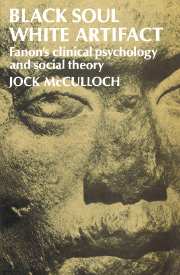Book contents
- Frontmatter
- Contents
- List of abbreviations
- Introduction
- Chapter 1 The three paradigms: negritude, ethnopsychiatry and African socialism
- Chapter 2 Negritude
- Chapter 3 Ethnopsychiatry and the psychopathology of colonialism: Fanon's account of colonised man in ‘Black Skin White Masks’
- Chapter 4 From psychiatric practice to political theory
- Chapter 5 Culture and personality
- Chapter 6 Class conflict and the liberation of Africa
- Chapter 7 The failed revolution
- Chapter 8 The neo-colonial state
- Chapter 9 Towards a critique of Fanon's class analysis
- Chapter 10 Conclusion
- Appendix I Fanon and Mannoni: conflicting psychologies of colonialism
- Appendix II Mental health in Algeria
- Notes
- Select Bibliography
- Index
Chapter 8 - The neo-colonial state
Published online by Cambridge University Press: 07 October 2009
- Frontmatter
- Contents
- List of abbreviations
- Introduction
- Chapter 1 The three paradigms: negritude, ethnopsychiatry and African socialism
- Chapter 2 Negritude
- Chapter 3 Ethnopsychiatry and the psychopathology of colonialism: Fanon's account of colonised man in ‘Black Skin White Masks’
- Chapter 4 From psychiatric practice to political theory
- Chapter 5 Culture and personality
- Chapter 6 Class conflict and the liberation of Africa
- Chapter 7 The failed revolution
- Chapter 8 The neo-colonial state
- Chapter 9 Towards a critique of Fanon's class analysis
- Chapter 10 Conclusion
- Appendix I Fanon and Mannoni: conflicting psychologies of colonialism
- Appendix II Mental health in Algeria
- Notes
- Select Bibliography
- Index
Summary
In The Wretched Fanon provides a scenario of the formal decolonisation process; he describes the influence of the international political climate on the independence struggles and the action of the contradictions internal to the metropoles; he defines the stances of the various strata of the colonised society and their role within the decolonisation movements. In short, his writings on the subject of formal or primary decolonisation are systematic in the extreme.
Fanon's description of the neo-colonial state under the dictatorship of the national bourgeoisie is equally coherent. He discusses the various agencies which support such dictatorships, from the residual colonial mentality among the peasantry, to the avarice of the national bourgeoisie itself. He refers to the decay of the nationalist parties and the economic subordination of the national economy to the interests of the metropolitan ruling class. Beyond this, Fanon outlines the means by which the rise of such dictatorships may be prevented, and stresses the necessary ordering of national affairs in the spheres of economic, cultural, social and military activity to achieve that end.
Yet Fanon's theory leaves completely unanswered the question how, once established, a dictatorship of the national bourgeoisie is to be overthrown. It is the absence of an answer to this question, more than any other single factor, which determines the status of Fanon's theory.
In The Wretched Fanon makes numerous references to the fragile and ephemeral character of national bourgeois regimes.
- Type
- Chapter
- Information
- Black Soul, White ArtifactFanon's Clinical Psychology and Social Theory, pp. 184 - 199Publisher: Cambridge University PressPrint publication year: 1983



